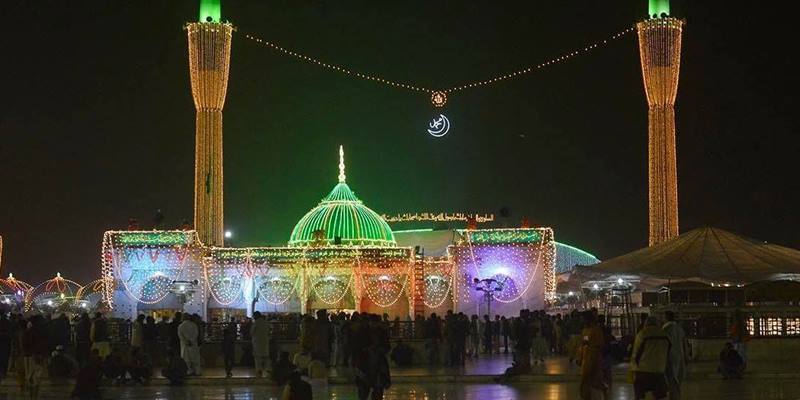A France24 story
By Leela JACINTO (where I was quoted)
The attack on the landmark Data Darbar shrine in the eastern Pakistani city of Lahore, which killed 41 people, was an assault on an ancient, traditionally syncretic form of Islam that is under siege in a fast radicalising country.
The attack, when it happened, was an assault on so many fronts, a calculated onslaught on the very soul of a centuries-old, flexible form of Islam.
On Thursday night, when militants stormed the landmark Data Darbar shrine in the eastern Pakistani city of Lahore, killing at least 41 people, it sent a bone-chilling message to a populace growing lamentably accustomed to violence.
The oldest and grandest shrine in Lahore, Data Durbar, also known as Data Ganj Baksh, houses the remains of the revered 11th century Sufi saint, Abul Hassan Ali Hajwery. His burial site attracts Sunni and Shia Muslims – as well as non-Muslims – from across the subcontinent. The shrine is particularly packed on a Thursday night, a traditionally sacred night in Islam.
A day after the attack, Raza Rumi, a Pakistani expert on Sufism and a native Lahori, was reeling from the shock.
“This is a tragedy on multiple levels,” said Rumi in a phone interview with FRANCE 24. “It’s a human tragedy, it’s an attack on the future of Pakistan, and it’s an attack on Islam, a lived Islam.”
‘An attack on the majority by a lunatic fringe’
An ancient, tolerant form of Islam, Sufism centres on the mystical connection between the individual and the divine. Propagated historically by travelling ascetics and storytellers, Sufism spread across the Muslim world, from its western flank in North Africa to the Indian subcontinent.
Along the way, it blended with local cultures, accepting worshippers across class, caste and religious divides.
With its ethos of egalitarianism, its focus on charity and its expressive forms of worship – including poetry and music – Sufism today is sometimes viewed as an alternative brand of spiritualism. Sufi Persian poets such as Rumi, a 13th century Persian poet, are particularly popular in New Age circles in the West.
But in South Asia – until recently – Sufism was the norm, not a fringe movement. For centuries, devotees across sectarian divides in what is now India and Pakistan have flocked to the shrines of various saints, petitioning the spirits of the holy men to intercede in their daily struggles against poverty, infertility and a host of other problems.
In the immediate aftermath of Thursday’s attack on the Data Durbar, some news reports referred to the attack on a Pakistani minority group. It’s a contention that had many Pakistanis bristling. “This is not an attack on a minority,” said Rumi. “It’s an attack on the majority by a lunatic fringe.”
Throughout history, Sufism has periodically come under attack from proponents of a more austere, radical Islam, who maintain that Sufism is a shirk – referring to the worship of someone other than God. Shirk is strictly forbidden in Islam and is punishable by death in some Muslim-majority countries, including Pakistan.
Fallout from the 1980s anti-Soviet jihad
The most serious affront to Sufism in Pakistan came during the 1980s jihad against the Soviet invasion in Afghanistan, when tens of thousands of freelance fighters from across the Arab world converged on the country and networks of madrassas preaching the austere Wahabi form of Islam spread across the country – particularly in what is now the Khyber-Pakhtunkhwa province in north-western Pakistan.
During the anti-Soviet jihad, funding from Saudi Arabia, the standard bearer of Wahabi Islam, helped extend the influence of Wahabism and other radical Salafi forms of Islam across Pakistan – at the cost of older, traditional forms of worship.
Harnessing Sufism?
In a country that produces a disturbing array of radical Islamist groups masterminding terrorist attacks, Sufism in some circles is viewed as a potential bulwark against growing fundamentalism in the Muslim world.
Last year, the Algerian government announced that it would promote the North African nation’s Sufi heritage on national radio and television in a bid to check the influence of Salafism.
In 2007, the Rand Corporation, a US think-tank, advised Western governments to “harness” the Sufism as an “open, intellectual interpretation of Islam”.
The prospect of Western governments jumping on the Sufi bandwagon however alarmed some Pakistani Sufi experts. “I think if it’s done it has to be done very quietly because a lot of people here are allergic to the West interfering,” said Ayeda Naqvi, a teacher of Islamic mysticism, in an interview with the BBC last year.
So far, no group has claimed responsibility for Thursday night’s attack. A spokesman for the Pakistani Taliban denied any involvement in the attack in an phone interview with the AFP. “This is a conspiracy by foreign secret agencies,” Azam Tariq, a spokesman for Tehrik-i-Taliban Pakistan told AFP by telephone from an undisclosed location.
Many Pakistani people however suspect the attack was planned by the Punjabi Taliban, the branch of the Taliban based in Pakistan’s most populous and prosperous Punjab province. The existence of the Punjabi Taliban in the heartland of Pakistan is particularly worrying for many Pakistanis.
A day after the Data Darbar attack, experts were questioning whether it would affect the practice of Sufism in Pakistan.
Rumi, who is a frequent Data Darbar visitor, maintained that the attack was not about to change the way average Pakistanis worshipped. But, he conceded, certain things would change.
“I will be afraid to visit the shrine again,” he confessed. “It’s getting dangerous – I think for now I have lost my favourite meditation space.”
Source URL: http://www.france24.com/en/20100702-pakistan-sufi-attack-islam-lahore-data-darbar-moderate-muslim-terrorism



